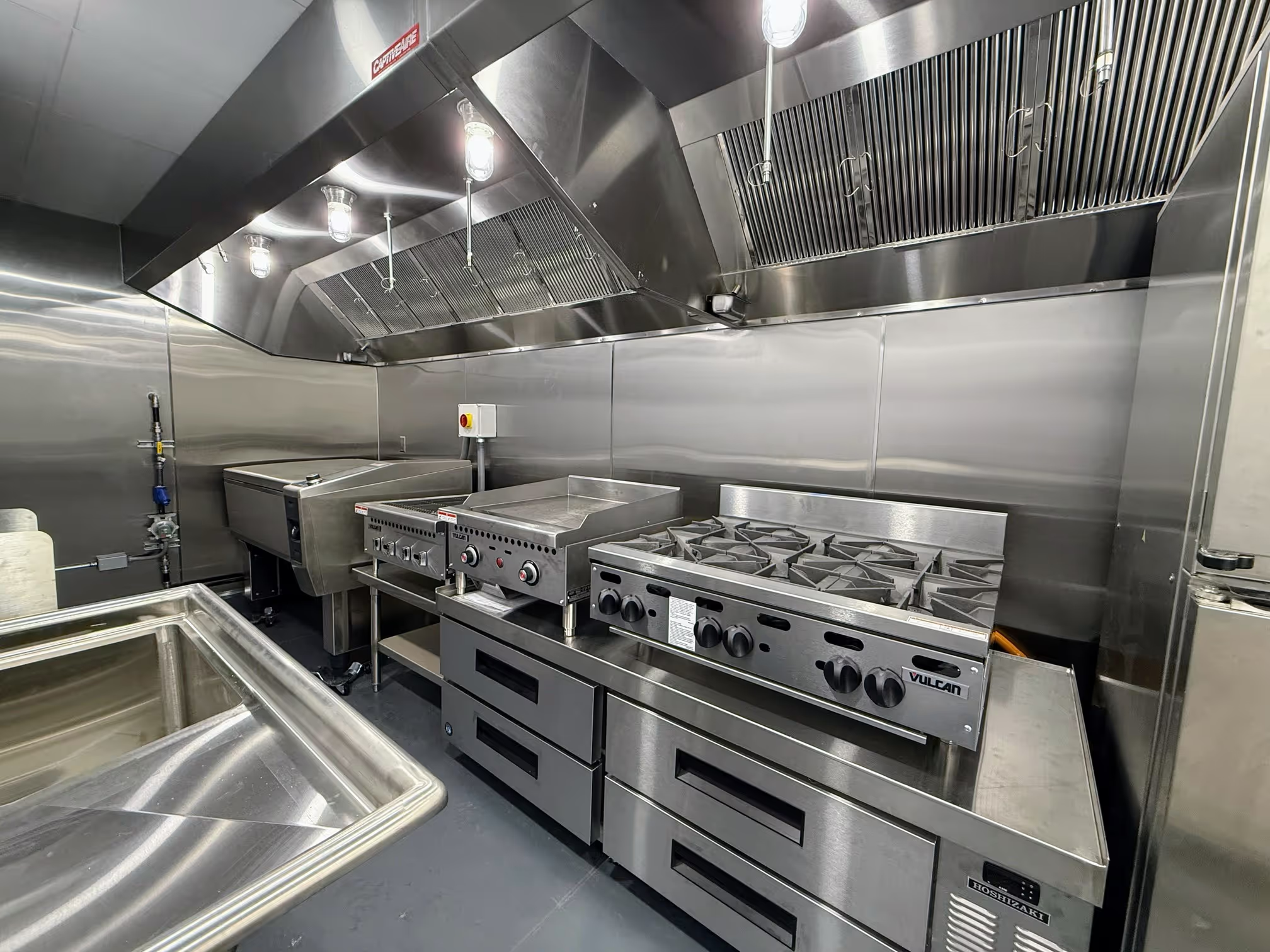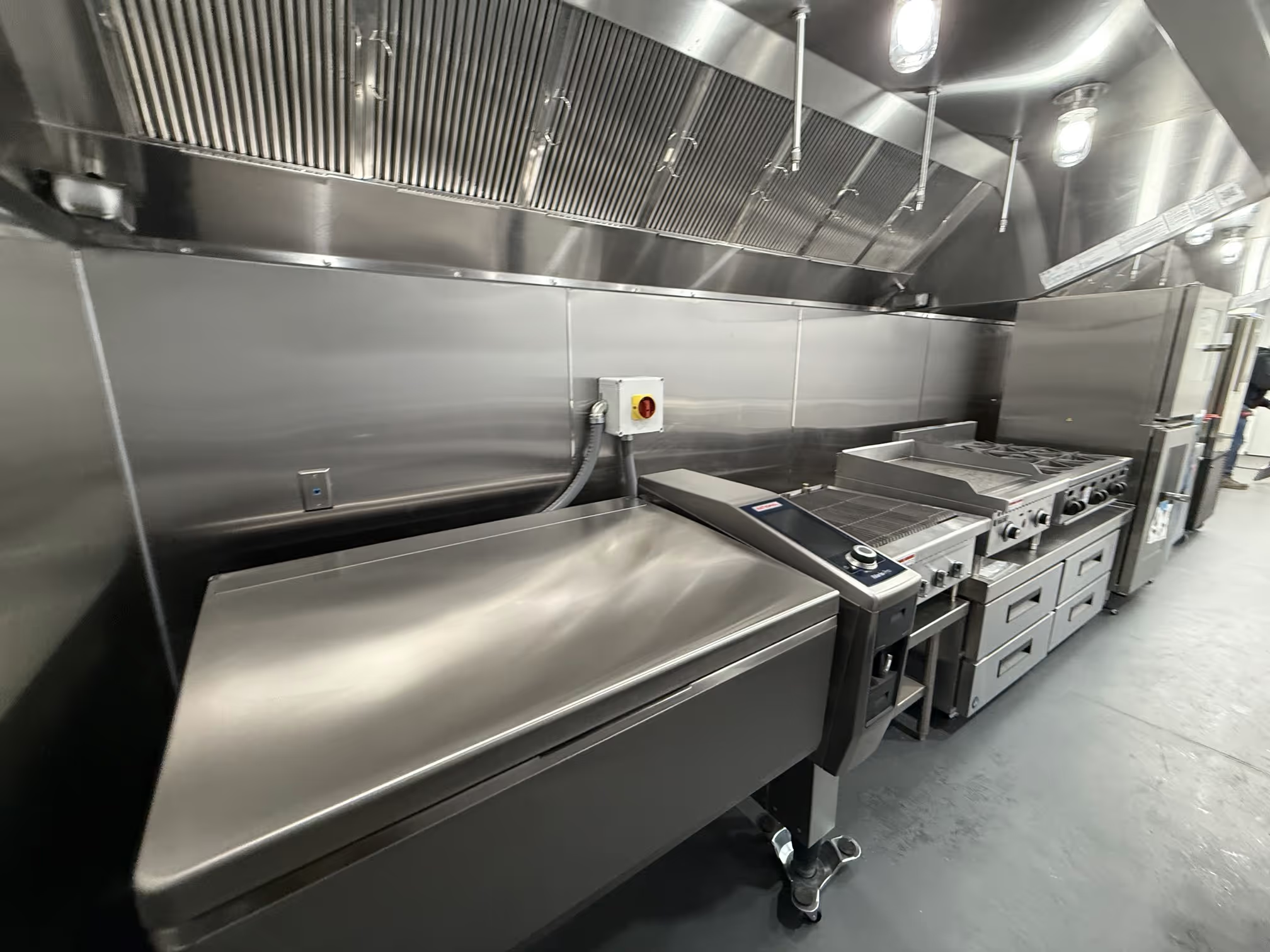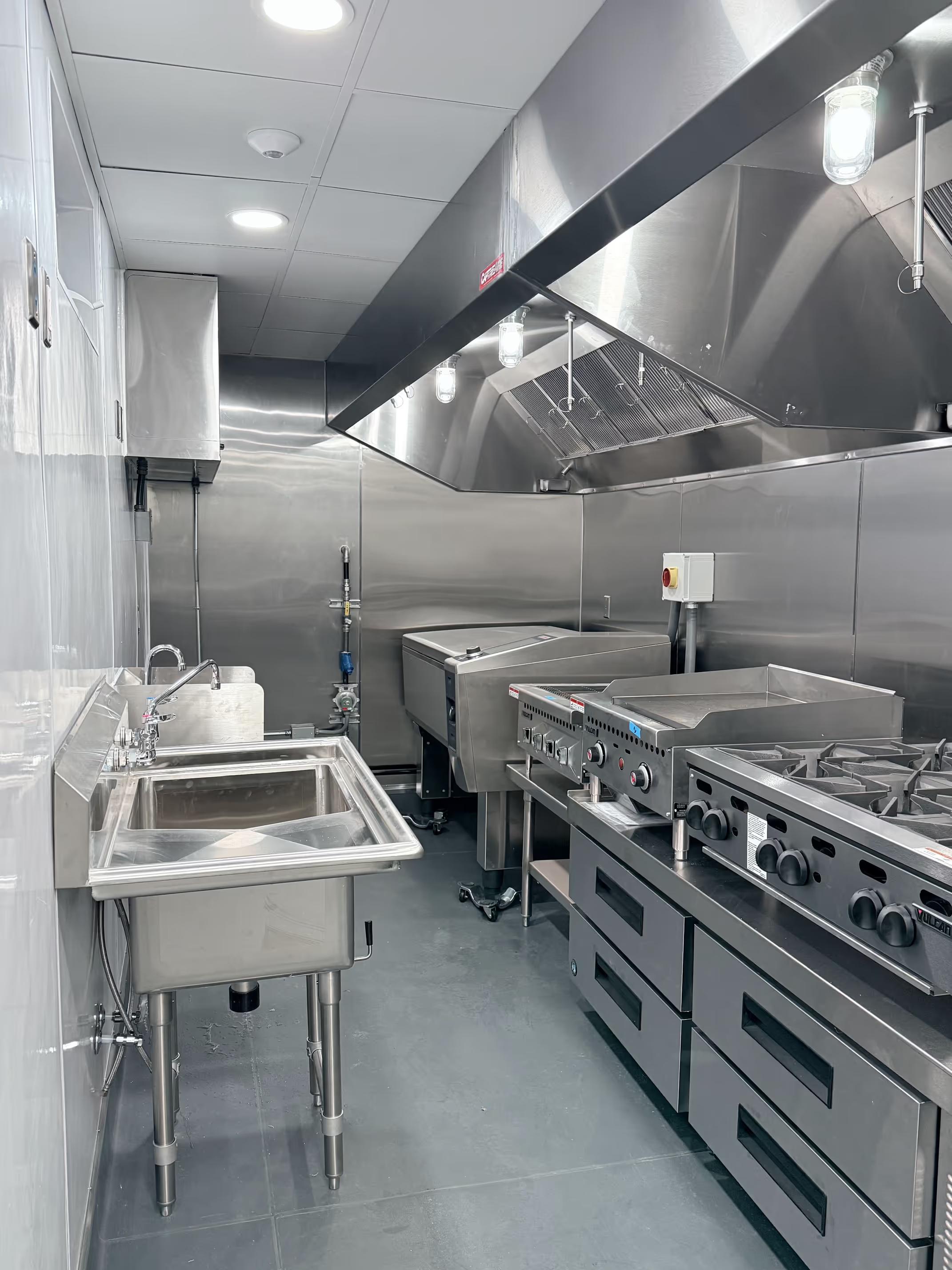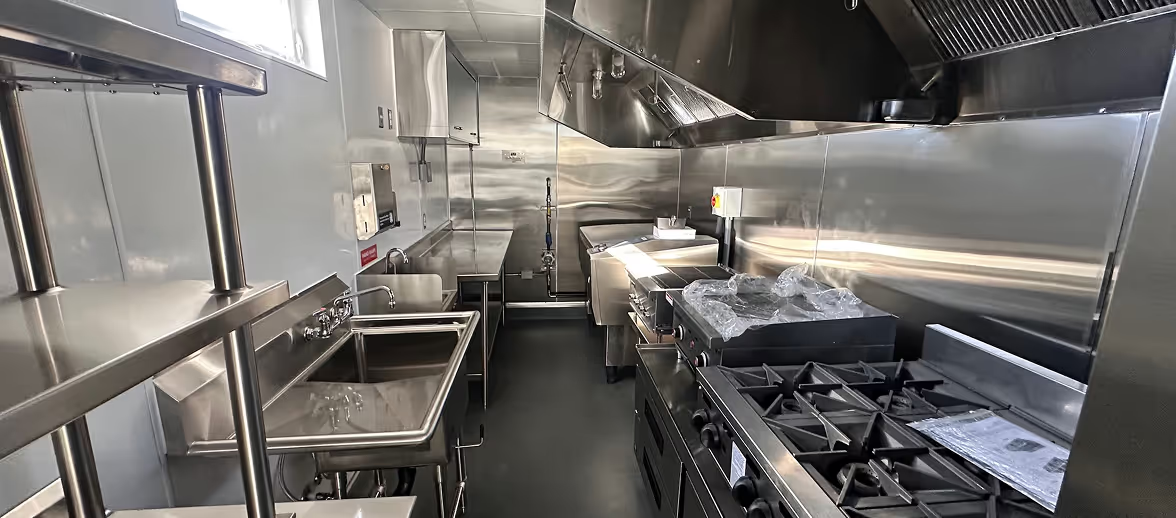%2520(1).jpeg)
Introduction
Picture this: It’s the height of your busiest season, and your kitchen is suddenly out of commission. Whether due to a scheduled renovation or an unexpected emergency, the pressure to keep operations running can be overwhelming. Losing access to your kitchen can severely disrupt your service.
This is where mobile kitchens come in, as they offer a flexible, fully equipped solution to keep your culinary operations running smoothly. But with so many options, selecting the right unit can be overwhelming.
This guide simplifies the process of selecting the right mobile kitchen by providing essential questions to guide your decision. We’ll cover everything you need to know, from design considerations and budget planning to timeline expectations and code compliance. This will ensure that your kitchen supports your menu, fits your space, aligns with your goals, and meets all necessary regulations.
Define Your Purpose & Mobile Kitchen Rental Timeline
Understanding the primary reason for renting a mobile kitchen helps determine the appropriate setup:
- Purpose: Are you addressing a renovation, expansion, disaster recovery, or event catering?
- Menu: What type of food will you be preparing?
- Volume: How many meals will you be serving per day?
- Duration: How long will you need the mobile kitchen (days, weeks, or months)?
- Start Date: Do you have an expected start date, or do you require a quick-deployment solution?
🔹 Note: Mobile Culinaire offers flexible rental options with fast delivery, ensuring your kitchen is ready when you need it. Rentals start from just 1 month, with mid and long-term rental options available to suit your project needs.
%2520(1).jpeg)
Assess Space & Mobile Kitchen Trailer Layout Needs
Efficient operation within the mobile kitchen requires careful consideration of space and layout:
- Staffing: How many staff members will be working inside the kitchen simultaneously?
- Functional Areas: Do you need separate zones for food prep, cooking, dishwashing, and storage?
- Customer Interaction: Is a customer-facing area necessary, or is it solely a back-of-house kitchen?
- Available Space: What are the dimensions of the area designated for the mobile kitchen?
- Accessibility: Do you require ADA-compliant access for staff or customers?
🔹 Note: Mobile Culinaire offers mobile kitchen trailers in 4 different sizes: 32’, 40', 53' and 2x53’. We also provide mobile support units, including refrigeration trailers, prep kitchens, dishwashing trailers, and laundry trailers.
🔺 Tip: Ensure the mobile kitchen layout complies with local accessibility regulations to accommodate all staff.
%2520(1).jpeg)
Determine Equipment & Storage for Commercial Mobile Kitchens
Identifying the necessary equipment and storage solutions is vital for optimal kitchen functionality:
- Cooking Equipment: What equipment is essential (e.g., ovens, fryers, grills, refrigerators)?
- Specialized Equipment: Does your menu require specific appliances like pizza ovens or wok burners?
- Refrigeration: What capacity do you need for refrigeration and freezing?
- Sanitation: Is a dishwasher or other sanitation equipment necessary?
- Smallwares: Will you need pots, pans, utensils, or will you supply your own?
🔹 Note: Mobile Culinaire's mobile kitchens come equipped with commercial-grade NSF-listed kitchen equipment, including cooking, refrigeration, dishwashing, and storage equipment in addition to walk-in coolers, freezer and dry storage, to meet diverse culinary needs.

Identify Mobile Kitchen Utilities and Infrastructure Requirements
Ensuring the mobile kitchen has the necessary utility connections is crucial:
- Power Requirements: What voltage and generator capacity are needed?
- Water and Sewage: Will the kitchen connect to existing systems, or is a self-contained unit required?
- Fuel Source: Is access to propane or natural gas necessary for cooking?
- Waste Management: How will grease and waste disposal be handled?
- Climate Control: Is an HVAC system needed for temperature regulation?
- Responsibility: Who is responsible for utility connections?
🔹 Note: Mobile Culinaire's mobile kitchens are delivered with all electrical, plumbing, and gas connections pre-installed. Clients are responsible for connecting to power, water, and gas sources. All utility costs during the lease are the responsibility of the client.
🔺 Tip: Plan for proper waste disposal methods, including grease traps, to comply with environmental regulations and maintain cleanliness.

Plan Site Logistics and Mobile Kitchen Placement
Consider the logistical aspects of deploying a mobile kitchen:
- Setup and Removal: Who will assist in the setup and removal?
- Site Accessibility: Is the location easily accessible for delivery and setup?
- Permitting: What local permits and approvals are required?
- Parking and Space: Is there adequate space for the mobile kitchen and any additional support units?
- Utility Access: Are necessary utilities readily available on-site?
🔹 Note: A Mobile Culinaire project coordinator will be on-site and assist in the setup and removal of your unit.
🔺 Tip: Check with local authorities for any zoning laws or permits required for placing a mobile kitchen in your desired location. Permitting timelines can vary widely, from 1 to 6 weeks.
.jpeg)
Ensure Code Compliance for Your Mobile Kitchen Trailer
Adhering to health and safety standards is non-negotiable:
- Permits and Approvals: Do you need permits or approvals from local authorities?
- Health Codes: Does the mobile kitchen meet local health department requirements?
- Fire Safety: Are fire suppression systems and ventilation adequate and compliant?
- Accessibility: Is the kitchen accessible to individuals with disabilities, as required by ADA regulations?
- Specific Food Handling: Does your kitchen need to comply with specific food handling standards (e.g., halal, kosher)?
🔹 Note: Mobile Culinaire’s kitchens meet commercial kitchen health and safety codes, ready for inspection in most locations.
🔺 Tip: Different cities and states have specific permit requirements for temporary kitchens. Research local health and zoning regulations before securing a rental.

Establish Budget for Mobile Kitchens for Lease or Rent
Understanding the financial implications helps in making informed decisions:
- Comprehensive Budgeting: What is your total budget for renting the mobile kitchen?
- Delivery and Setup: Are there additional charges for delivery, setup, or breakdown?
- Recurring Operational Costs: Will you have ongoing expenses like fuel, water supply, or professional cleaning?
- Backup Power: Do you need a backup generator, and what are the associated costs?
- Permitting Fees: What are the costs associated with obtaining necessary permits?
- Extended Rental Penalties: Are there penalties for exceeding the rental period or damaging equipment?
- Insurance: Is insurance coverage required, and what are the associated costs?
🔺 Tip 1: Verify with your insurance provider whether your policy covers mobile kitchen operations or if additional coverage is necessary.
🔺 Tip 2: Be aware of potential hidden costs such as delivery, setup, and removal fees, which can add up quickly.
Final Mobile Kitchen Rental Checklist
Before finalizing your mobile kitchen rental, ensure the following:
- Timeline Alignment: Ensure the delivery and setup timeline aligns with your project schedule.
- Needs Assessment: Clearly define your operational requirements and expectations.
- Site Evaluation: Confirm the suitability of the location for the mobile kitchen setup.
- Compliance Verification: Ensure all health, safety, and accessibility standards are met.
- Budget Confirmation: Review and confirm all costs associated with the rental.
%2520(1).jpeg)
Why Choose Mobile Culinaire for Mobile Kitchen Rentals
Mobile Culinaire stands out as a premier provider of mobile kitchen solutions:
Mobile Kitchen Expertise
Mobile Culinaire brings 10 years of experience in designing and delivering high-quality mobile kitchens. Their deep understanding of the industry enables them to provide reliable, efficient solutions that cater to a wide variety of culinary and operational needs.
Temporary Kitchens That Feel Permanent
Mobile Culinaire delivers high-performance temporary kitchen units designed to function like permanent facilities. Each unit is engineered for durability, efficiency, and compliance, offering a seamless cooking experience without compromise, even in temporary settings.
Code Compliance
Health and safety are top priorities for Mobile Culinaire. All their units are built to meet or exceed current health codes and safety regulations, giving clients peace of mind and ensuring smooth operation in any location.
Dedicated Customer Service & Support
Mobile Culinaire offers comprehensive support throughout the entire process, from the initial planning phase to final deployment and day-to-day operation. Their dedicated team ensures clients have the guidance and resources they need every step of the way.
Explore our premium mobile kitchen rentals tailored to your needs. Request a consultation or browse our models today.
.jpeg)
People Also Ask (FAQ)
What are the main criteria for choosing a mobile kitchen trailer?
Key criteria for selecting a mobile kitchen trailer include your project’s purpose and timeline, the type and volume of food being prepared, available space, and required kitchen layout. You’ll also need to consider essential cooking and refrigeration equipment, utility access (power, water, gas), site logistics like delivery and permitting, and compliance with local health, safety, and accessibility codes. Budget planning (rental duration, operational costs, and setup fees) is also critical.
How much space is needed for a mobile kitchen rental?
The space needed for a mobile kitchen rental typically ranges from 150 to 1,000+ sq ft, depending on the size and complexity of the operation. Small units (8–20 ft) serve up to 150 meals/day, while larger modular setups can support 1,000+ meals/day. Additional space is needed for access, utility hookups, and support units like storage or dishwashing.
Do mobile kitchen rentals need permits?
Yes, mobile kitchen rentals usually require local health department permits, and in some cases, building, fire, or utility permits as well. Requirements vary by city or county, so it’s important to check with local authorities before setup. The rental provider often helps with guidance or documentation for approvals.
Testimonial

"What is standing out when you look at the mobile kitchen operation is the efficiency that we can really achieve because it's built for that."
Tell us about your kitchen needs and request a quote.
.png)
Turnkey mobile kitchen
.png)
Proudly made in-house in the USA
.png)
Commercial grade kitchen equipment
.png)
Code-compliant
Trusted by Industry Leaders




.gif)

%20(1).avif)
%20(1).avif)
%20(1).avif)